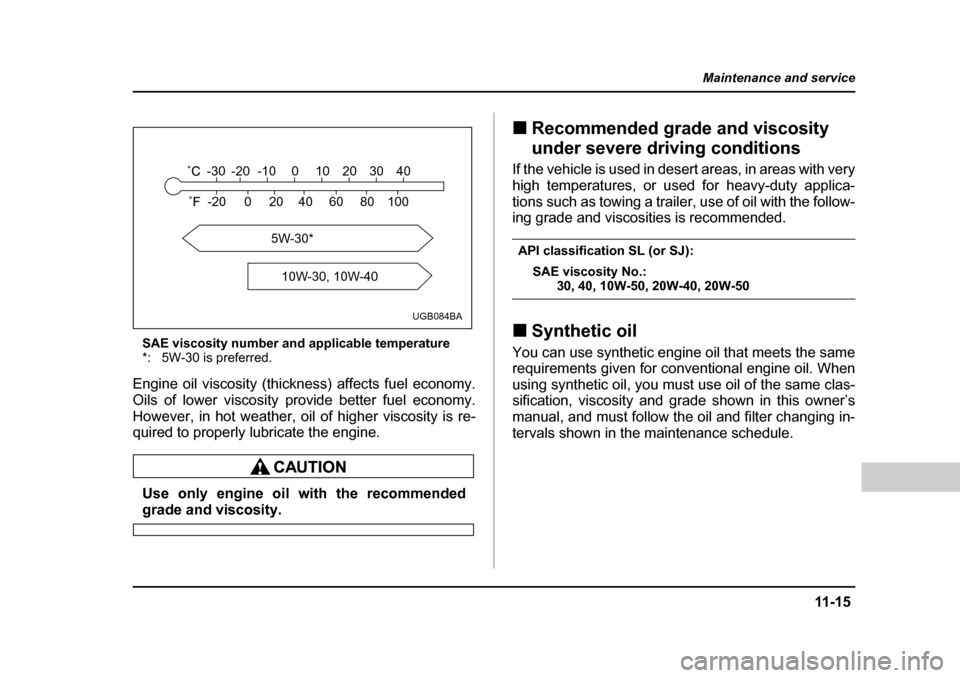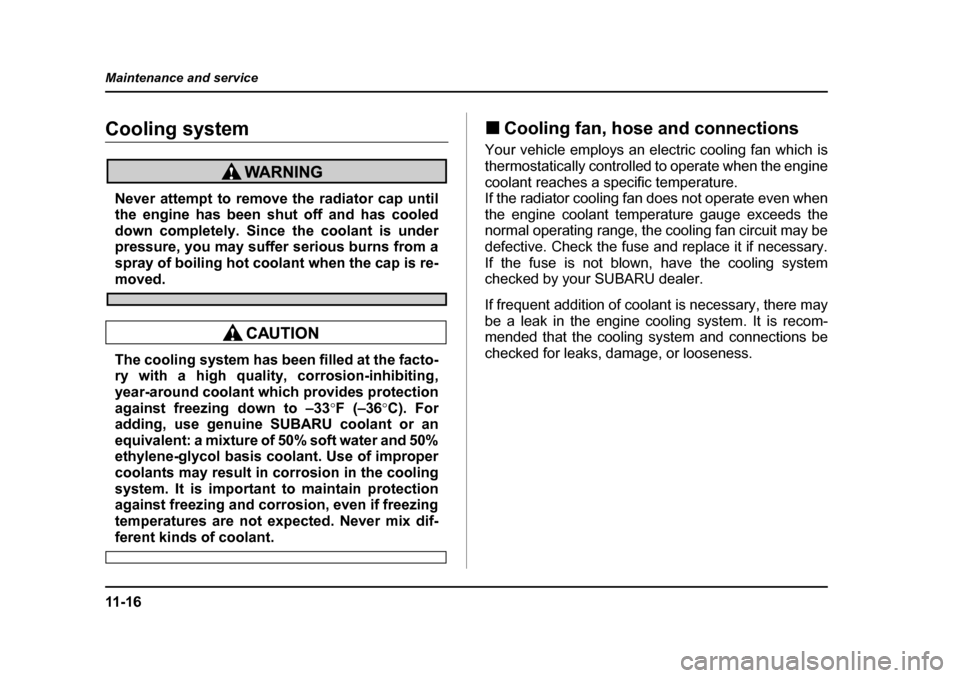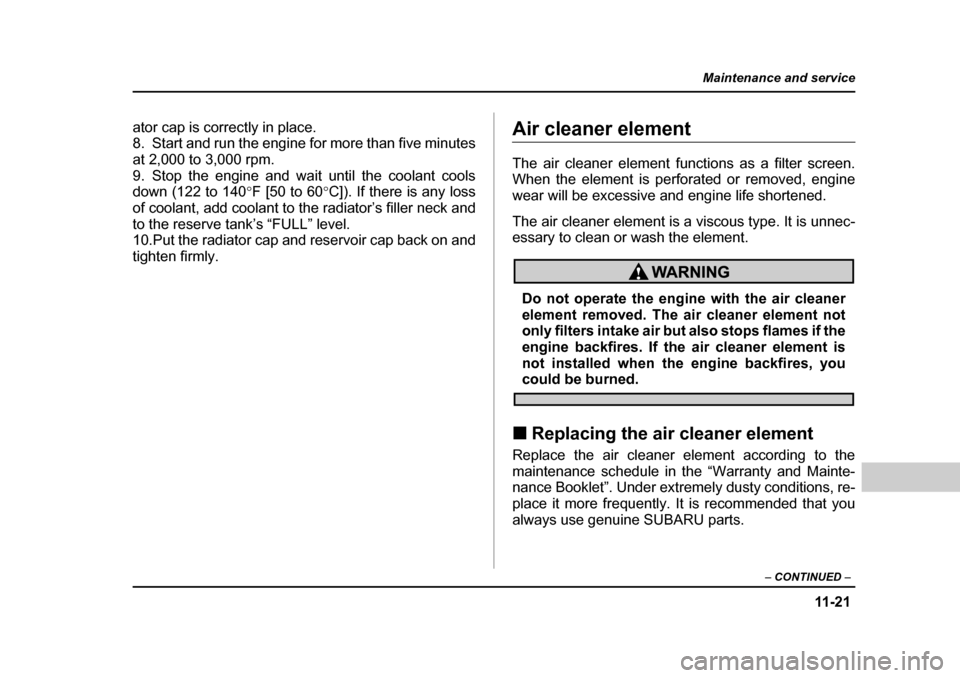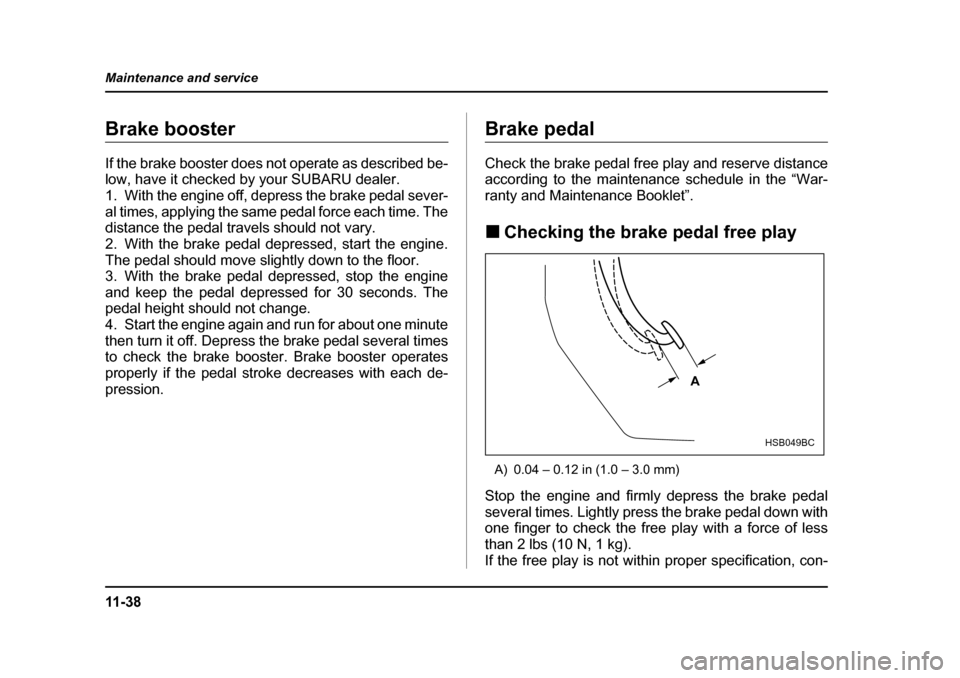Page 380 of 477

11 -1 5
Maintenance and service
– CONTINUED –
SAE viscosity number and applicable temperature
*: 5W-30 is preferred.
Engine oil viscosity (thickness) affects fuel economy.
Oils of lower viscosity provide better fuel economy.
However, in hot weather, oil of higher viscosity is re-
quired to properly lubricate the engine.
Use only engine oil with the recommended
grade and viscosity. �„
Recommended grade and viscosity
under severe driving conditions
If the vehicle is used in desert areas, in areas with very
high temperatures, or used for heavy-duty applica-
tions such as towing a trailer, use of oil with the follow-
ing grade and viscosities is recommended.
API classification SL (or SJ):
SAE viscosity No.:
30, 40, 10W-50, 20W-40, 20W-50
�„ Synthetic oil
You can use synthetic engine oil that meets the same
requirements given for conventional engine oil. When
using synthetic oil, you must use oil of the same clas-
sification, viscosity and grade shown in this owner’s
manual, and must follow the oil and filter changing in-
tervals shown in the maintenance schedule.
5W-30*
10W-30, 10W-40
-30 -20 -10 0 10 20 30 40
-20
06 0
20 80 100 40
UGB084BA
Page 381 of 477

11 - 1 6
Maintenance and service
Cooling system
Never attempt to remove the radiator cap until
the engine has been shut off and has cooled
down completely. Since the coolant is under
pressure, you may suffer serious burns from a
spray of boiling hot coolant when the cap is re-
moved.
The cooling system has been filled at the facto-
ry with a high quality, corrosion-inhibiting,
year-around coolant which provides protection
against freezing down to –33
°F (–36 °C). For
adding, use genuine SUBARU coolant or an
equivalent: a mixture of 50% soft water and 50%
ethylene-glycol basis coolant. Use of improper
coolants may result in corrosion in the cooling
system. It is important to maintain protection
against freezing and corrosion, even if freezing
temperatures are not expected. Never mix dif-
ferent kinds of coolant. �„
Cooling fan, hose and connections
Your vehicle employs an electric cooling fan which is
thermostatically controlled to operate when the engine
coolant reaches a specific temperature.
If the radiator cooling fan does not operate even when
the engine coolant temperature gauge exceeds the
normal operating range, the cooling fan circuit may be
defective. Check the fuse and replace it if necessary.
If the fuse is not blown, have the cooling system
checked by your SUBARU dealer.
If frequent addition of coolant is necessary, there may
be a leak in the engine cooling system. It is recom-
mended that the cooling system and connections be
checked for leaks, damage, or looseness.
Page 382 of 477
11 -1 7
Maintenance and service
– CONTINUED –
�„Engine coolant
�T Checking the coolant level
A) “FULL” level mark
B) “LOW” level mark
Check the coolant level at each fuel stop.
1. Check the coolant level on the outside of the reser-
voir while the engine is cool.
2. If the level is close to or lower than the “LOW” level
mark, add coolant up to the “FULL” level mark. If the
reserve tank is empty, remove the radiator cap and re-
fill as required. A) Rubber gaskets
3. After refilling the reserve tank and the radiator, re-
install the caps and check that the rubber gaskets in-
side the radiator cap are in the proper position.
�y Be careful not to spill engine coolant when
adding it. If coolant touches the exhaust pipe, it
may cause a bad smell, smoke, and/or a fire. �y Do not splash the engine coolant over paint-
ed parts. The alcohol contained in the engine
HSB018CC
A
B
A
HSB026BC
Page 383 of 477
11 - 1 8
Maintenance and service
coolant may damage the paint surface.
�T Changing the coolant
A) Drain plug
Always add genuine Subaru cooling system condition-
er whenever the coolant is replaced.
Change the engine coolant and add genuine Subaru
cooling system conditioner using the following proce-
dures according to the maintenance schedule.
1. Remove the under cover.
2. Place a proper container under the drain plug and
loosen the drain plug. 3. Loosen the radiator cap to drain the coolant from
the radiator. Then drain the coolant from the reserve
tank. Tighten the drain plug securely.
Never attempt to remove the radiator cap until
the engine has been shut off and has cooled
down completely. Since the coolant is under
pressure, you may suffer serious burns from a
spray of boiling hot coolant when the cap is re-
moved.
4. Install the under cover.
AHSB027BC
Page 385 of 477
11 - 2 0
Maintenance and service
Guideline of coolant quantity (including coolant in reservoir tank):
Non-turbo models: MT. 7.3 US qt (6.9 liters, 6.1 Imp qt)
AT. 7.2 US qt (6.8 liters, 6.0 Imp qt)
Turbo models: MT. 7.8 US qt (7.4 liters, 6.5 Imp qt)
AT. 7.7 US qt (7.3 liters, 6.4 Imp qt)
A) “FULL” level mark
B) “LOW” level mark
6. Pour the coolant and fill to the reservoir tank’s
“FULL” level mark.
�y Be careful not to spill engine coolant when
adding it. If coolant touches the exhaust pipe, it
may cause a bad smell, smoke, and/or a fire. �y Do not splash the engine coolant over paint-
ed parts. The alcohol contained in the engine
coolant may damage the paint surface.
A) Rubber gaskets
7. Put the radiator cap back on and tighten firmly. At
this time, make sure that the rubber gasket in the radi-
HSB018CC
A
B
A
HSB026BC
Page 386 of 477

11 -2 1
Maintenance and service
– CONTINUED –
ator cap is correctly in place.
8. Start and run the engine for more than five minutes
at 2,000 to 3,000 rpm.
9. Stop the engine and wait until the coolant cools
down (122 to 140 °F [50 to 60 °C]). If there is any loss
of coolant, add coolant to the radiator’s filler neck and
to the reserve tank’s “FULL” level.
10.Put the radiator cap and reservoir cap back on and
tighten firmly.Air cleaner element
The air cleaner element functions as a filter screen.
When the element is perforated or removed, engine
wear will be excessive and engine life shortened.
The air cleaner element is a viscous type. It is unnec-
essary to clean or wash the element.
Do not operate the engine with the air cleaner
element removed. The air cleaner element not
only filters intake air but also stops flames if the
engine backfires. If the air cleaner element is
not installed when the engine backfires, you
could be burned.
�„ Replacing the air cleaner element
Replace the air cleaner element according to the
maintenance schedule in the “Warranty and Mainte-
nance Booklet”. Under extremely dusty conditions, re-
place it more frequently. It is recommended that you
always use genuine SUBARU parts.
Page 394 of 477

11 -2 9
Maintenance and service
– CONTINUED –
SAE viscosity No. and applicable temperature
Automatic transmission fluid �„Checking the fluid level
The automatic transmission fluid expands largely as
its temperature rises; the fluid level differs according to
fluid temperature. Therefore, there are two different
scales for checking the level of hot fluid and cold fluid
on the dipstick.
Though the fluid level can be checked without warm-
ing up the fluid on the “COLD” range, we recommend
checking the fluid level when the fluid is at operating
temperature. �T Checking the fluid level when the fluid is hot
Check the fluid level monthly.
1. Drive the vehicle several miles to raise the temper-
ature of the transmission fluid up to normal operating
temperature; 154 to 176 °F (70 to 80 °C) is normal.
2. Park the vehicle on a level surface and set the park-
ing brake.
3. First shift the selector lever in each position. Then
shift it in the “P” position, and run the engine at idling
speed.-30 -20 -10 0 10 20 30 40
-20 0 60 20
80W
75W/90 80 100
40
85W 90
HSB036BA
Page 403 of 477

11 - 3 8
Maintenance and service
Brake booster
If the brake booster does not operate as described be-
low, have it checked by your SUBARU dealer.
1. With the engine off, depress the brake pedal sever-
al times, applying the same pedal force each time. The
distance the pedal travels should not vary.
2. With the brake pedal depressed, start the engine.
The pedal should move slightly down to the floor.
3. With the brake pedal depressed, stop the engine
and keep the pedal depressed for 30 seconds. The
pedal height should not change.
4. Start the engine again and run for about one minute
then turn it off. Depress the brake pedal several times
to check the brake booster. Brake booster operates
properly if the pedal stroke decreases with each de-pression.Brake pedal
Check the brake pedal free play and reserve distance
according to the maintenance schedule in the “War-
ranty and Maintenance Booklet”. �„
Checking the brake pedal free play
A) 0.04 – 0.12 in (1.0 – 3.0 mm)
Stop the engine and firmly depress the brake pedal
several times. Lightly press the brake pedal down with
one finger to check the free play with a force of less
than 2 lbs (10 N, 1 kg).
If the free play is not within proper specification, con-
A
HSB049BC